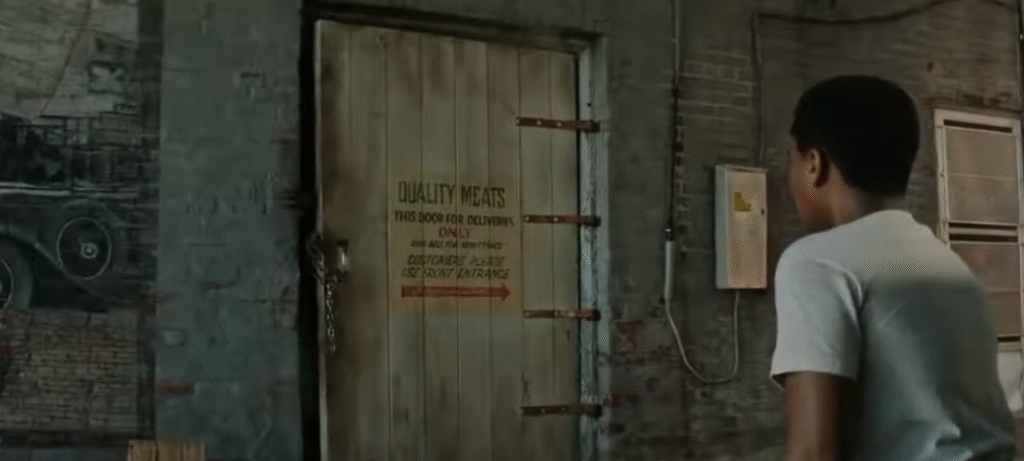His composed demeanor, measured speech, and reflective thoughts are not just characteristics of a historian; they are the remnants of a loss-shaped upbringing. The bravery that would ultimately characterize Mike’s determination to combat the evil that plagued Derry for generations was ingrained in his parents, William and Jessica Hanlon.
The Hanlon family was aware of Derry’s vicious tendencies long before Mike joined the Losers’ Club. Mike’s grandfather, Leroy Hanlon, was a disciplined and devout man. He exemplified resilience forged in adversity as a disciplined Air Force pilot who eventually turned to farming. He instilled in his family the idea that remaining silent in the face of injustice was a sign of submission. His accounts of odd events in Derry, such as fires, missing persons, and rumors of something strange, were presented as cautions rather than ghost stories.
Mike’s moral compass was his grandmother, Charlotte Hanlon. She was outspoken, sympathetic, and incredibly brave, tackling the town’s racial divide at a time when few dared. Her descendants were forever changed by her conviction that compassion was a more powerful weapon than hatred. She became a quiet hero in the family’s history because of her defiance, especially during the racially charged 1960s.
Character Information – Mike Hanlon and His Family
| Attribute | Details |
|---|---|
| Full Name | Michael “Mike” Hanlon |
| Father | William “Will” Hanlon |
| Mother | Jessica Hanlon |
| Grandfather | Leroy Hanlon |
| Grandmother | Charlotte Hanlon |
| Birthplace | Derry, Maine, USA |
| Occupation | Historian and Librarian of Derry |
| Notable Appearance | Stephen King’s IT (1986 novel, 2017–2019 films, Welcome to Derry series) |
| Known For | Member of the Losers’ Club and keeper of Derry’s dark history |
| Reference | Stephen King Wiki: https://stephenking.fandom.com/wiki/Mike_Hanlon |

Will Hanlon, their son, inherited his mother’s compassion as well as his father’s discipline. Will’s early years were divided between survival and war. He experienced atrocities in the Army Air Corps that extended well beyond the battlefield. The Black Spot, a nightclub in Derry constructed by Black servicemen, was a pivotal moment in his life. It served as a symbol of solidarity in addition to being a venue for music and laughter. Will barely made it out alive when the Legion of White Decency set it on fire.
The Black Spot fire was not your typical hate crime. It was among Derry’s first paranormal misfortunes. Will carried the memory of that night as both trauma and mission after being saved by a young soldier named Dick Hallorann, who would go on to appear in The Shining. His subsequent life turned into a memorial. He gathered evidence of the evil that lurked beneath Derry’s courteous exterior by keeping journals, newspaper clippings, and photographs. Mike’s future as the town’s librarian would be shaped by his dedication to recording its obscure past.
Despite being quieter, Jessica Hanlon was just as strong. The purest form of resistance, in her opinion, is education. Her affection for Mike was both empowering and protective. She frequently reminded him that “truth has a way of surviving — even when people don’t,” encouraging curiosity even in the face of fear. That feeling served as Mike’s emotional cornerstone as an adult.
But their passing ripped a hole in Derry’s past. Will passes away from cancer in Stephen King’s original novel, and Jessica later dies in a fire. A family consumed by the very evil they attempted to comprehend makes the tragedy feel incredibly personal. In the 2017 adaptation, young Mike is left orphaned after both parents perish in a house fire. Some locals saw it as an accident, while others saw it as a sign. The event’s horror was heightened by its ambiguity.
These incidents are reenacted with eerie realism in the HBO series Welcome to Derry. The fire is reframed as a collision between racial tension, inherited trauma, and Pennywise’s manipulation, rather than as a coincidence. The series depicts perseverance by incorporating Will’s past into the greater myth of Derry. Will’s passing serves as a trigger for Mike’s awakening rather than its conclusion.
Mike learned the importance of truth as a means of survival from his father. His painstaking documentation of Derry’s peculiar cycles—fires, floods, and disappearances—was preservation rather than paranoia. When Mike remained in Derry while his friends moved on, those same habits would come to define him decades later. His choice to stay was a silent act of resistance that carried on the tradition of a father who would not allow history to be forgotten.
The way the Hanlon family’s story ties common struggle with supernatural fear is incredibly powerful. It serves as a reminder to readers that the monsters that haunt Derry are not just fictional characters but also representations of prejudice, memory loss, and loss. A chain of bravery that goes beyond horror clichés is formed by Will’s life as a Black soldier returning to a divided town, Jessica’s quiet perseverance, and Mike’s lifelong responsibility as Derry’s librarian.

